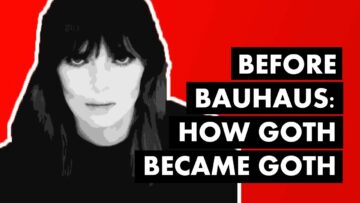

“You look so goth today” one might say to a friend wearing too much eyeliner or black nail polish or leather pants. But goth is so much more than just a look, the maker of the above video claims, walking viewers through a brief history of the blues, rock, punk, post-punk, and new romantic waves made to the sound and style of what came to be called goth rock (though none of these artists described themselves that way). The video essay claims goth has been hijacked by ersatz pretenders like Marilyn Manson and My Chemical Romance, who might look the part but bear little resemblance sonically or culturally to forebears like The Doors, The Cure, The Birthday Party, or (this video’s stopping point) goth rock darlings Bauhaus.
Maybe the distinctions seem like trivial subcultural squabbling, but the essay raises an interesting question about the origin of the word “goth” as a subculturally descriptive term. It’s easy to see how someone might mistake oughties emo rockers for 80s goths; it’s perhaps more of a stretch to see how 70s and 80s goth rock carried forth the creative spirit of a medieval architectural style or a 19th-century literary genre. Superficially, we might say the operative link is “dark and scary,” but if that’s all it takes to be “goth,” then we’re back to goth as costume rather than a set of artistic tenets. Examining the Gothic a bit more closely may give us clues to the distinctiveness of Goth.
Author Nick Groom identifies a historical tension within the Gothic. First used in the 16th century to describe the ornate pan-European style that arose back in the 12th century, the term was pejorative, implying that the glories of Rome had been replaced by the barbarism of the German Goths (despite the fact that Gothic style originated in France). The Gothic was revived in the 18th and 19th centuries — at first almost single-handedly by Horace Walpole, who wrote the first Gothic novel and turned his home, Strawberry Hill, into a Gothic theme park of sorts. By this point, says Groom above, the Gothic had taken on dual connotations in English usage — positively, the Gothic was a rebellious spirit: The Magna Carta was Goth. Martin Luther was Goth.
On the other hand, the Gothic referred to the occult, to Medieval Catholic rites and superstitions, to ancient ruins, monsters, and gargoyles. This is the Gothic with which we’re familiar, but it comes to us — via Walpole, Bram Stoker, Edgar Allan Poe, etc. — as kitsch. “Gothic fiction began as a sophisticated joke,” John Mullan observes of Walpole’s weird novel, The Castle of Otranto. For all its investment in the darker regions of human experience, the Gothic, and thereby the Goth, has always had a certain sense of humor about itself, creating cavernous sounds that evoke cathedral acoustics, performed with an ironic theatricality that dramatizes literary, Romantic excesses — qualities, it must be said, few bands before or since embodied quite so succinctly as goth rock darlings Bauhaus.
Related Content:
“A Brief History of Goths”: From the Goths, to Gothic Literature, to Goth Music
Three-Hour Mixtape Offers a Sonic Introduction to Underground Goth Music
Josh Jones is a writer and musician based in Durham, NC. Follow him at @jdmagness
Before Bauhaus: How Goth Became Goth is a post from: Open Culture. Follow us on Facebook and Twitter, or get our Daily Email. And don't miss our big collections of Free Online Courses, Free Online Movies, Free eBooks, Free Audio Books, Free Foreign Language Lessons, and MOOCs.
from Open Culture https://ift.tt/3yvXzLj
via Ilumina



Comments
Post a Comment